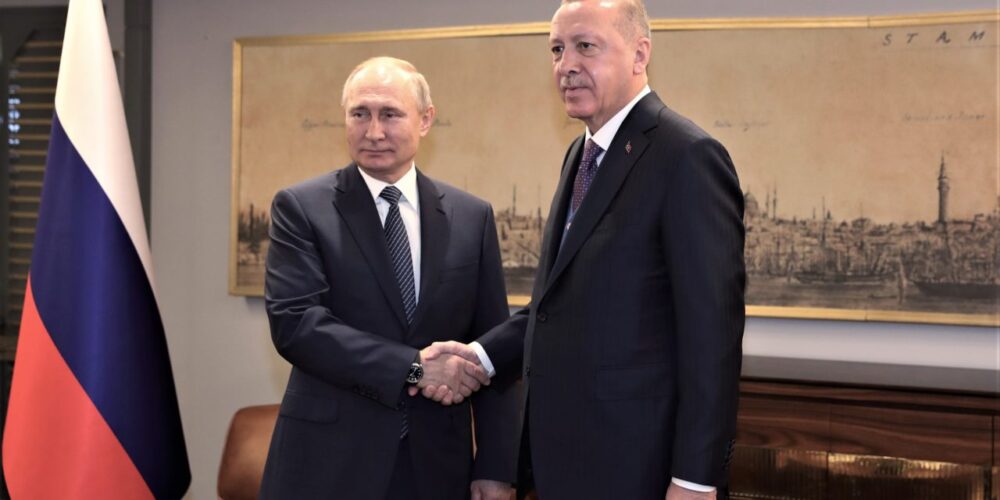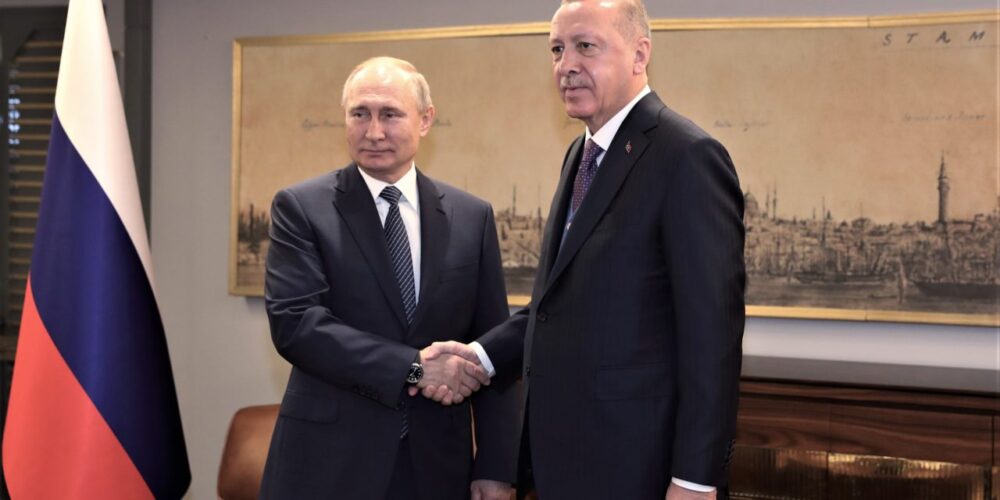BY: Daniel Ranjbar

PEJOURNAL – In 1787, with several European ambassadors, the Russian Empress Catherine II visited Crimea. The purpose of the trip was to reassure and deceive the ambassadors before a new war against the Sublime Porte with regard to Russia’s true power ability.
To this end, Crimean Governor Grigory Potemkin set up mobile villages full of soldiers dressed as farmers to show a fake picture of a fully developed countryside with flourishing agricultural activity. Since then, ‘Potemkin settlements’ have become synonymous with diplomatic deceit and have had a profound influence on the history of Russian foreign policy.
As Vladimir Lukin notes, Russian Foreign policy has a “passion for mere show, the Potemkin village syndrome” (Lo 2002, 67).
Even during its imperial era, Russia showed an interest in the Middle East that had much to do with Moscow’s soft-power expansionism in the region.
Imperial Russia, however, developed a distinct hesitation towards the prospect of antagonizing the European powers that had already shadowed the region. The main reason for this diplomatic indecision was that the Balkans, the Caucasus and Central Eastern Europe were much more important than the Middle East for Russia.
Vladimir Putin’s arrival, first as a prime minister and then as president, came with a conservative stance, preserving the fundamental lines of the Russian foreign policy of Yeltsin. The new administration’s main concern in the Middle East was to prevent the transmission of regional crises to the Russian Federation’s nucleus, such as the rise of Jihadism.
Putin has fought Jihadism in Chechnya and other nearby regions since his early days in office. At the same time, heavy pressure was exerted on the Kremlin by strengthening the Taliban regime and the influence of al-Qaeda in Afghanistan. As Oded Eran describes Putin’s early days:
“Relating specifically to the Middle East, what transpires is that Russia’s top objective in that geographical space is political stabilization for the purpose of forestalling the spillover of political and military crises, endemic to the region into the volatile regions of central Asia and the Caucasus, inside Russia and out, in its near abroad”
(Eran 2003, 159).
Russia with this history for interest in the Middle East and changing politics after Entering Vladimir Putin to Power, just brings us this question: How the changes in Russian–Western relations affect the evolution of the Kremlin’s Middle Eastern strategy and Foreign policy? Is Western act against Russia created motivation for Putin to influence more in the Middle East?
This is how popular Russian tabloid Moskovsky Komsomolets views the change:
“Russia plays the role of the universal mediator and political broker, and none of the regional powers can ignore it.”
Russia’s Middle East Strategy
Since the fall of the Soviet Union, Russia’s current presence in the Middle East is unprecedented for the region. Diplomatic and political interaction records show increased contacts between Russia and the major regional countries of multi-level delegations. Moscow has been trying to cultivate deeper involvement in regional issues since 2012 and create ties with powers in the Middle East, which it considers legitimate.
The Kremlin is targeting the following three target groups by stepping up its current activities in the region:
• Economic: to counter the negative effects of sanctions on the Russian economy; to maintain established sources of income; to protect the interests of Russian energy firms and their share of the global oil and gas market.
• Political: preventing full international isolation; building leverage that can influence U.S. and EU actions outside the region; propagandizing Moscow’s definition of “right world order;” influencing mainstream Russian opinion.
• Security: reduction of potential security threats posed by the situation in the Middle East to Russia and post-Soviet space.
Russia’s Middle East strategy includes a number of elements. First of all, Moscow continues to defend what it sees in the region’s assisted lines. Second, Russia tends to try to regain its position in the Cold War as a counterbalance to the region’s United States. Third, in its official dialog with the countries of the region, Moscow avoids using political rhetoric. Nevertheless, Moscow is not omnipotent. The performance is more often than not dictated by EU and US policy errors.
I want to mention one of the reasons that today Russia in the Middle east and acting more powerful than before is West politics. Sanctions that started against Iran, Turkey , China , Russia and some other countries in the region, created an opportunity for Russia to find more common goals with Middle East countries than before. Nowadays Russian relations with the Middle East region is very better than the West and especially the USA. Actually when the Trump administration started to work Russia found so many different opportunities in global politics.
Never before Putin’s arrival was the Middle East at the forefront of the Russian (or Soviet) agenda. After the 9/11 attacks, however – and particularly after the Arab Spring – Putin’s Russia saw the unstable situation of the Middle East as an excellent opportunity to expand its reach. Simultaneously, it was a perfect opportunity to keep the Western world’s gaze away from areas of greater strategic importance to the Kremlin, such as the Caucasus and Central-Eastern Europe. Different experts today say that a new cold war between the US and Russia has already penetrated the international system.
Nonetheless, in the Middle East, Russia is now adopting a more aggressive policy and this is likely to continue as the region deepens into crisis. There are no more settlements of Potemkin in the Middle East. Rather, along with a strong Russian tendency to intensify antagonism with the West, there are raw ambitions. In the past, Russia’s regional influence has been confined to its capability to guard its allies. As mentioned, throughout the Cold War, Moscow was once much less supportive of the Zionist regime than Arab countries.
In 2003 and 2011, Moscow only watched the US-led military intervention in the overthrow of Saddam Hussein and Muammar Gaddafi; Two international locations that had friendly family members with Moscow. However, the Russians in Syria have shown that they have the military electricity and political will to preserve Bashar al-Assad.
Some professionals consider that Russia has overtaken the United States in turning into a leading participant in the region, or at least a pressure to be reckoned with. However, the Russians in this vicinity do not have smooth strength assets such as cultural similarities and historic relations; But it must be stated that the Middle East countries’ frustration with the effects of Western intervention has helped them.
The US popularity in the place has been damaged through the unfortunate legacy of the invasion of Iraq and their failure in the Syrian civil war. The travel embargo on residents of 5 Muslim-majority countries, as nicely as the US decision to cross its embassy to Jerusalem and cut off useful resource to the Palestinians, has paved the way for Russia to make bigger its influence. Accordingly, Russia’s growing influence in the vicinity reflects the weak point of the United States as nicely as its personal strength. However, apart from Russia’s relative success in the Middle East, Russia’s hassle is retaining a stability between its family members with Iran and other actors in the region, specifically Saudi Arabia and Israel.
Sources
- Allison, Roy. 2009. The Soviet Union and the Strategy of non-alignment in the Third World. Cambridge: Cambridge University Press.
- Allison, William Thomas. 2012. The Gulf War 1990–1991. Basingstoke & New York: Palgrave Macmillan.
- www.bbc.com
- Eran, Oded. ‘Russia in the Middle East: The Yeltsin Era and Beyond’. In Russia between East and West: Russian Foreign Policy on the Threshold of the 21st Century, edited by Gabriel Gorodetsky, 159-170. London: Frank Cass, 2003.
- Garfinkle, Adam. 2016. ‘Follyanna?’, The American Interest, February 11, 2016. https://www.the-american-interest.com/2016/02/11/follyanna/
